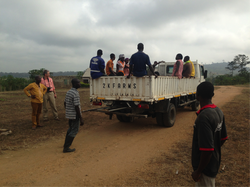 A truckload of harvesters.
A truckload of harvesters. At the end of January The Farm Channel hosted a delegation of Canadian and American agribusiness professionals. Below is a post from Les Kahl, Managing Partner, US at AdFarm, one of our partners.
By Les Kahl.
Last week I was in Ghana. Before I left I really had no idea what to expect. I suppose I had some stereotypes in my mind, but other than that I was going in terribly ignorant. Our entourage consisted of AdFarmers, educators and we were later joined by folks from the North Dakota Trade Office. Traveling in a large group of North Americans while in Ghana had both its advantages and challenges but that’s another post.
While in Ghana we spent most of our time in the southern, rural farming region near the capital city Accra. The areas we experienced were made up of beautiful countryside, rolling hills and natural vegetation. We drove through small towns and villages – all with different standards of housing, but the majority of shelters were very small half-finished structures, re-purposed shipping containers or mud huts. The deeper we got into the rural areas the rougher the roads became. Heavy machinery is almost nonexistent. Anything that would be handled by machines and a trained crew in North America like road repair, was done by hand.
Almost all the farming we witnessed (small or large operations), was done by hand. Clearing, planting, spraying, harvesting – all of it. Mechanized help just doesn’t exist. Even if there were machines available getting a consistent supply of quality fuel is very difficult, and then there is the question of maintenance… It’s a very different then the North American agriculture sector.
Abundant potential.
Agriculture in Ghana is full of potential. Quality land and an irrigation source (the largest man-made lake in the world, Lake Volta,) make it ripe for advancement. I hope the farmers of Ghana will soon be growing more food not only for themselves but the rest of the world as well. I’ll be watching Ghana grow with great interest over the next few years.
By Les Kahl.
Last week I was in Ghana. Before I left I really had no idea what to expect. I suppose I had some stereotypes in my mind, but other than that I was going in terribly ignorant. Our entourage consisted of AdFarmers, educators and we were later joined by folks from the North Dakota Trade Office. Traveling in a large group of North Americans while in Ghana had both its advantages and challenges but that’s another post.
While in Ghana we spent most of our time in the southern, rural farming region near the capital city Accra. The areas we experienced were made up of beautiful countryside, rolling hills and natural vegetation. We drove through small towns and villages – all with different standards of housing, but the majority of shelters were very small half-finished structures, re-purposed shipping containers or mud huts. The deeper we got into the rural areas the rougher the roads became. Heavy machinery is almost nonexistent. Anything that would be handled by machines and a trained crew in North America like road repair, was done by hand.
Almost all the farming we witnessed (small or large operations), was done by hand. Clearing, planting, spraying, harvesting – all of it. Mechanized help just doesn’t exist. Even if there were machines available getting a consistent supply of quality fuel is very difficult, and then there is the question of maintenance… It’s a very different then the North American agriculture sector.
Abundant potential.
Agriculture in Ghana is full of potential. Quality land and an irrigation source (the largest man-made lake in the world, Lake Volta,) make it ripe for advancement. I hope the farmers of Ghana will soon be growing more food not only for themselves but the rest of the world as well. I’ll be watching Ghana grow with great interest over the next few years.
 RSS Feed
RSS Feed